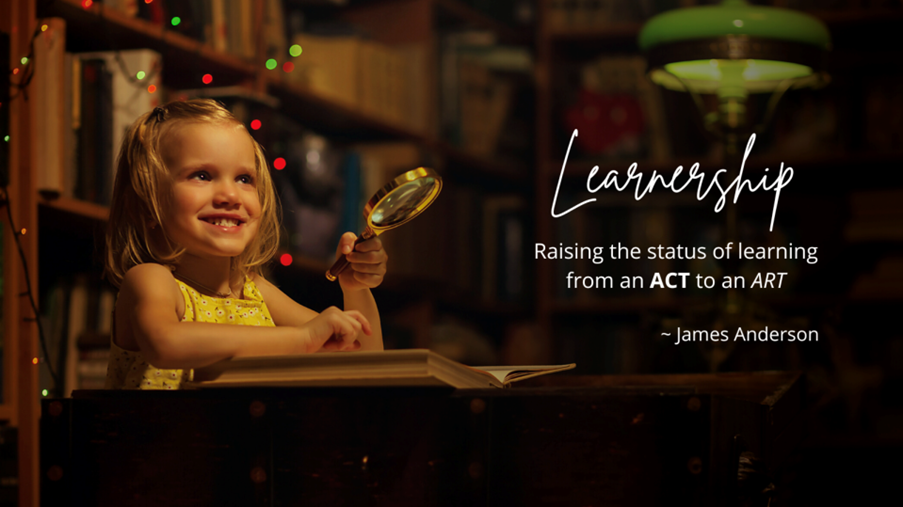What Is Learnership?
As I continue to work on my new book, I've been reflecting on a question I often get asked: What is learnership?
It's a fair question. Afterall, it's a word I made up. I like to think of Learnership as the coming together of learning and craftsmanship. It helps us shift from what we are learning, to how we are learning and then to how well are we learning. In doing so, it raises the status of learning in your school from an act, to an art.
When Daniel Goleman introduced the world to Emotional Intelligence the idea that emotions and intelligence could go together seemed crazy. In fact, before Goldman’s work emotion and intelligence were often thought of as opposite, or at least separate, abilities. Today of course the idea of emotional intelligence is not only well understood, it is considered an essential skill to develop for success in life and work.
Similarly, when Edward de Bono coined the term “lateral thinking, it created shock waves. The dominant paradigm was about deep, critical, or logical thinking. Why would anyone think sideways, and what did that even mean? But de Bono changed all that, and unless you’re stretching out well towards the end of your career, you’ve probably always just assumed that Lateral Thinking was a thing. It wasn’t. Edward de Bono made it up, and the term “lateral thinking” is now part of our vernacular.
Of course, neither Goleman nor de Bono made up their ideas. The ability to understand your emotions or to generate ideas has always been important. What they did was to shine a light on those ideas, naming them and highlighting their importance. Combining two concepts that we already understood helped both pique interest and gave people a framework to understand their ideas.
Learnership™ is like that. It brings together two existing concepts. The act of learning and expertise of craftsmanship.
Learnership™ = Learning + Skilfulness
By bring those paradigms together we create something new, insightful, and powerful. The skill of learning. It shifts the way we think and talk about learning from being something that we do, to being something we can learn to do well.

Of course, the idea that we can be skilful learners isn’t entirely new. But by naming it, and most importantly defining and describing it, it becomes something we can talk about, focus on. It brings the skill of learning into sharp focus as an essential life skill.
Learnership™ in Schools
When our students habitually avoid challenges, their learning stalls. When they learn to understand, value, and embrace challenge, their learning accelerates. So, helping our students develop a healthy relationship with challenge becomes one of the most important ways we can help them become better learners.
Learnership raises the status of learning from an act, to an art.There is an essential shift required to bring Learnership™ into your school or classroom. What we need to do is to take the paradigm of skilfulness and apply it to the concept of learning.
For example, consider domain you are familiar with in which there are experts who have developed mastery. Perhaps you think of chess, karate, cooking, playing classical music or a sport you’re familiar with, anything that could be considered as a well-defined area of expertise.
Now ask yourself, what ideas come to mind as you consider expertise? Perhaps you think of the dedication required over long periods of time. The need to practice to develop new skills. Perhaps you recognise the progression from beginner to expert. And there’s often a specialized language that’s been developed to help describe and engage in that skill development.
In applying the paradigm of expertise to the skill of learning, we recognise that developing expertise in learning has similar qualities to the way we develop expertise in any other domain. We must understand what expertise in learning looks like. We must understand the progression from beginner to expert, and the skills that are developed along the way. And we must develop a language of learning to allow us to describe our expert domain.
Once we start thinking of learning as a skill, it allows us to define and most importantly develop it as an intentional learning outcome in our schools and classrooms.
Defining Learnership™
I define learnership™ as the expertise a person develops in learning. Like all skills, it is developed over time, through deliberate use of practice, and dedicated strategies. It is an improvement in the ability to learn and results in the learning gaining more from every learning opportunity.
Like other areas of expertise, we can recognise improvements in how individuals engage in the learning process. I describe this in my Learnership™ Matrix. As you progress from non-learner through to Agile Learner you are able to gain more from every learning opportunity. In short, you get better at getting better.
Of course, defining and describing Learnership™ is just the start. The hard work starts when we begin to develop it. But that’s a topic for another day (and another book)!
How did we ever do without it?
In the not-too-distant future Learnership™ will become a part of the way we talk about learning. Just like emotional intelligence is how we now think about emotions and lateral thinking is how we think about creativity.
Schools and parents will talk not only about what their child is learning, but also about how well they are learning. Parents will ask to be informed about how their child is developing as a skilful learner. And schools will be expected to intentionally develop the skill of learning.
When learnership™ becomes our focus, schools will shift from being places where “learning happens” to places where students learn to become skilful learners. We’ll look back and wonder how we ever did without the concept.
Best Wishes,
James
Stay connected with news and updates!
Join my mailing list to receive the latest news and updates about mindset, Habits of Mind, Learning Agility and more.
